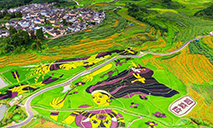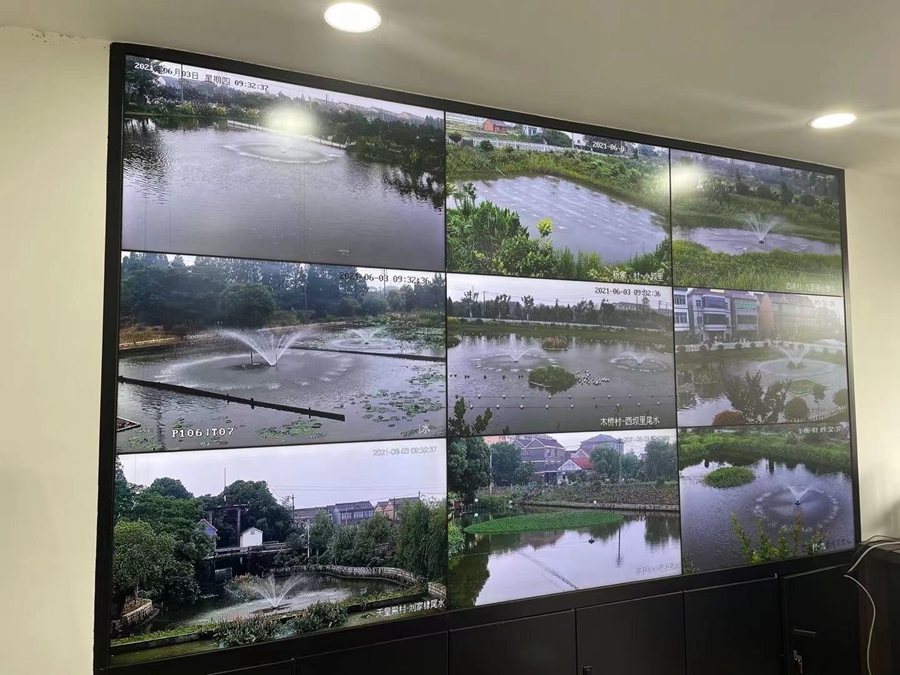Digital technologies boost rural economy in E China’s Deqing county (2)
Zhang Qiming, a snakehead fish farmer in Xigang village, Yuyue township, Deqing county, east China’s Zhejiang province, has achieved an increase in fish yield because of a “digital fish”, or an artificial intelligence (AI) underwater robot.
The “digital fish”, with a length of no more than 50 cm, is a small oval device equipped with various sensors. It can help monitor in real time the condition of fish ponds through the Internet of Things (IoT), according to Zhang.
After putting the “digital fish” into his fish pond and logging in to his account on a mobile app, he can get real-time data on many environmental factors indicating the condition of the fish pond, such as dissolved oxygen in water, pH, and water temperature, and conduct many activities including accurately providing feed for fish and routine inspection as the device provides a panoramic virtual display of the fish pond, Zhang disclosed.
“Thanks to the ‘digital fish’ developed by a research institute, my fish ponds have seen higher yield,” Zhang said.
The research institute Zhang mentioned is one established in Sanlin village, Yuyue township by a research team from Zhejiang University for the application of digital technologies in rural areas in 2019.
Successful practices of the institute have been incorporated into a report released by the Center for Informatization Study, Chinese Academy of Social Sciences, as typical cases of digital technologies empowering rural economy.
Today, more and more living examples of digital technologies boosting rural economy are seen in Deqing county, including the Tsingsky Mogan Mountain Urban Agricultural Park, an urban agriculture complex featuring smart vegetable factory, which has been put into production in the county.
The vegetable factory of the project, which includes functional zones for production, intelligent management and control, seedling cultivation, and storage of equipment, mainly produces a kind of thin-skinned tomato.
“Smart technologies used for management and control of our vegetable factory can effectively reduce production cost and improve the quality and yield of products. It’s estimated that the annual output of our factory can exceed one million kilograms, 30 to 50 times that achieved through traditional agricultural production mode,” said an executive of the company running the vegetable factory.
In recent years, Deqing has actively promoted the in-depth integration of digital technologies into the real economy in rural areas, and constantly driven the emergence of new business forms and models as well as new drivers of economic growth, for which Deqing county has won the honorary title of “national model county in promoting the development of agriculture and rural areas through digital technologies”.
Meanwhile, digital technologies and e-commerce have also benefited the production and sale of agricultural products in Deqing county, making farming more profitable for local residents.
Chen Zhongliang, a farmer in Yuyue township, is one of the local farmers who have reaped the fruits of digital technologies and e-commerce.
Chen started to run a farm after he graduated from college. As the size of his business grew, the sale of his products became a headache for Chen.
Just when Chen couldn’t figure out a solution to his problem, the research institute in Sanlin village launched a training project in 2019, aiming to cultivate rural talents for agricultural innovation by providing training courses on knowledge about digital economy, innovative thinking, and systematic operation and management of live-streaming and short-video platforms. Chen immediately signed up for the training, which helped him find the answer to his problem.
In addition, with the help of the new delivery model jointly developed by the government of Yuyue township, express companies, and e-commerce platforms, the online and offline sales of Chen’s products have increased significantly. Last year, the man saw the sales volume of his farm surpass four million yuan (about $617,200).
Efforts to accelerate digital transformation in rural areas of China should be focused on two aspects, according to Jiang Qiping, director of the Center for Informatization Study.
On the one hand, China needs to improve and upgrade its digital infrastructure and promote the popularization of relevant facilities in rural areas, and on the other hand, the country should pool the strength of various parties to improve rural workers’ digital literacy through systematic training, so as to enable farmers to truly take part in the development of the digital era, Jiang said.
 |  |
Photos
 Dance show saluting traditional culture of the Song Dynasty makes its debut
Dance show saluting traditional culture of the Song Dynasty makes its debut Village in SW China’s Yunnan embraces prosperity through agricultural tourism
Village in SW China’s Yunnan embraces prosperity through agricultural tourism Eighth birthday for pair of giant pandas celebrated in Haikou, Hainan province
Eighth birthday for pair of giant pandas celebrated in Haikou, Hainan province Olympic gold medalists portrayed in Shanxi artist’s polymer clay sculptures
Olympic gold medalists portrayed in Shanxi artist’s polymer clay sculptures
Related Stories
- First Asian carp industrial park in U.S. heralds triumph over invasive fish
- Fishermen harvest fish on Chengdong Lake in E China's Anhui
- Fish species in Yangtze River on brink of extinction as water quality declines
- Fishermen build wall with 2,000 fish in Jilin
- People in China's Jiangsu catch fish to meet market demand ahead of New Year
Copyright © 2021 People's Daily Online. All Rights Reserved.







